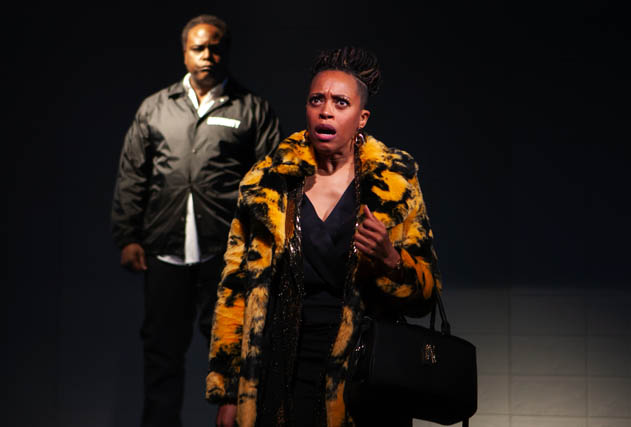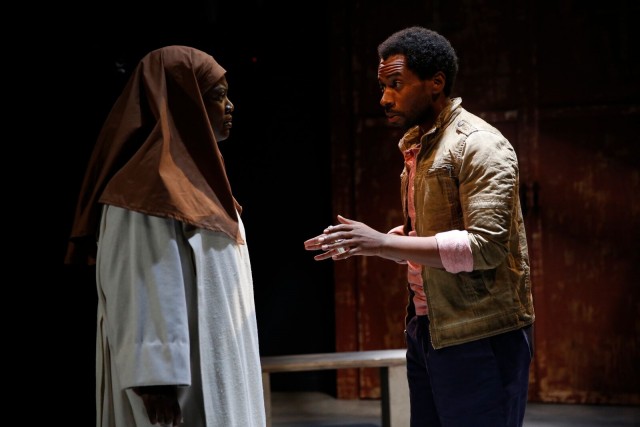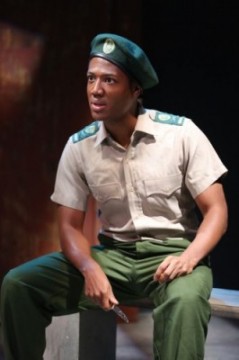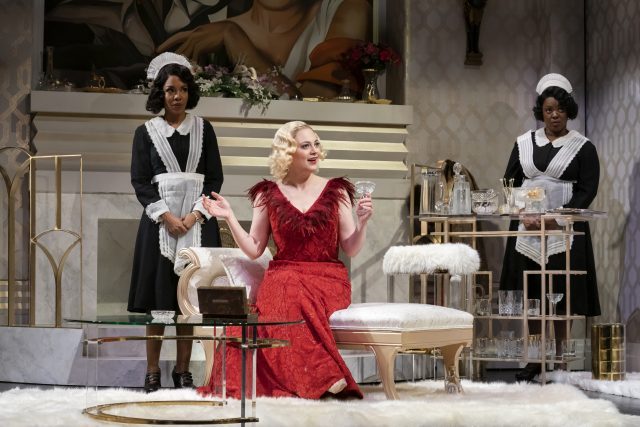
Gloria Mitchell (Jenni Barber) holds court as maids Vera Stark (Jessica Frances Dukes) and Lottie McBride (Heather Alicia Simms) look on in Lynn Nottage revival (photo by Joan Marcus)
The Pershing Square Signature Center
The Irene Diamond Stage
480 West 42nd St. between Tenth & Eleventh Aves.
Tuesday-Sunday through March 3, $35 after $60
212-244-7529
www.signaturetheatre.org
www.meetverastark.com
As the name of Lynn Nottage’s 2011 play suggests, the title character in By the Way, Meet Vera Stark is an afterthought, an aside. And indeed, as the rowdy and wild Signature revival, which opened tonight at the Irene Diamond Stage, reveals, Stark is central in the fictional world of the play but represents the sad legacy of Tinseltown racism from the Golden Age of Hollywood through to the present day. The story begins in 1933, when “America’s Sweetie Pie,” glamorous actress Gloria Mitchell (Jenni Barber), is rehearsing with her maid, Vera Stark (Jessica Frances Dukes), for the lead in the upcoming Hollywood film The Belle of New Orleans, about an octoroon prostitute and her maid, Tilly. While Gloria has trouble with her lines, Vera has a firm handle on the part of the maid; in fact, she wants to audition for the film too. When Vera returns to her tiny apartment — a far cry from Gloria’s absurdly ritzy, overdecorated home — she tells one of her roommates, Lottie McBride (Heather Alicia Simms), about the movie. “A Southern epic! Magnolias and petticoats. You know what else it means, cotton and slaves,” Vera says. “Slaves? With lines?” Lottie responds excitedly. They both decide that getting a job in the film is worth it no matter how demeaning or stereotypical the part might be.
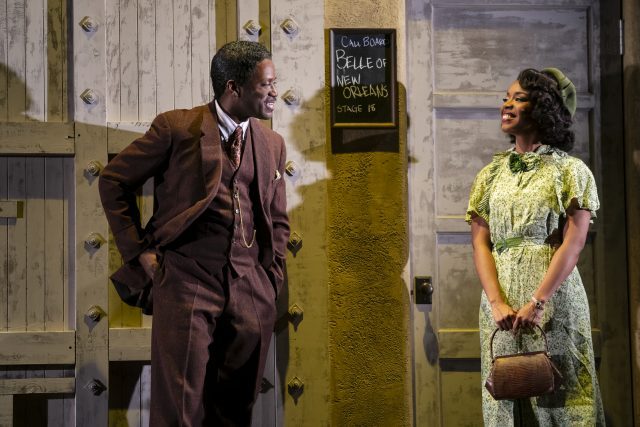
Leroy (Warner Miller) attempts to charm Vera (Jessica Frances Dukes) in By the Way, Meet Vera Stark (photo by Joan Marcus)
Meanwhile, the third roommate, Anna Mae Simpkins (Carra Patterson), is passing as South American instead of black to date big-time director Maximillian Von Oster (Manoel Felciano). Later, outside the audition stage, Vera meets jazz and blues musician Leroy Barksdale (Warner Miller), who claims to be Von Oster’s Man Friday. When he hears that Vera is interested in playing Tilly, he belittles the role and she calls him a fool. “You find that funny, do ya?” he replies. “Don’t get me wrong. I’m up for a good laugh as much as the next fella, but why we still playing slaves. Shucks, it was hard enough getting free the first damn time.” Later, at a party, studio head Mr. Slavsick (David Turner) expresses his displeasure at hearing some of the details of the film, which he fears will violate the Hays Code, the industry’s morality guidelines that banned such elements as miscegenation, profanity, licentiousness, and white slavery. The second act moves ahead to 1973 and 2003 as we see the aftereffects of the events that occurred back in 1933, placing them in a contemporary context that questions just how much things have not changed in Hollywood and society at large.
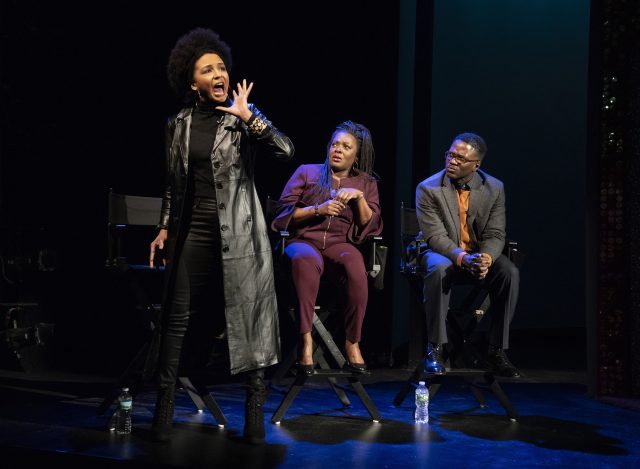
Carra Patterson, Heather Alicia Simms, and Warner Miller change roles for second act of Lynn Nottage play at the Signature (photo by Joan Marcus)
Nottage’s second work in her Signature residency (following a fine revival of Fabulation, or The Re-Education of Undine), By the Way, Meet Vera Stark tackles such issues as slavery, class, and racism by indicting everyone involved in the system. Vera, Lottie, and Anna Mae are not left unscathed by their participation in Hollywood’s portrayal of blacks, willing to sacrifice a part of themselves in order to be successes, even though their options are few in depression-era America. “It tickles me how half the Negroes in this town are running around like chickens without heads, trying to get five minutes of shucking and jiving time, all so they can say they’re in the pictures. It’s just lights and shadows, what’s the big deal?” Leroy says to Vera, adding, “If you wanna be in pictures, where you gonna begin, and where are you gonna end?” Two-time Pulitzer Prize winner Nottage (Sweat, Ruined) has crafted clever caricatures of real Hollywood people, including Miriam Hopkins and Carole Lombard (Gloria), Hattie McDaniel and Ruby Dandridge (Lottie), Dolores del Rio and Carmen Miranda (Anna Mae), Adolph Zukor and Darryl Zanuck (Slavsick), Erich von Stroheim and King Vidor (Von Oster), and Theresa Harris and Nina Mae McKinney (Vera). Despite the slapstick, the characters are so believable that you might think that Vera Stark was a real actress; for its 2012 run at the Geffen Playhouse, a faux documentary was made, with Peter Bogdanovich discussing her impact on film and culture, fooling many people into thinking Vera actually existed.
Director Kamilah Forbes’s (Between the World and Me, Detroit ’67) production nails the screwball comedies of the 1930s in the first act and the world of celebrity in the second. Dede M. Ayite’s period costumes and Mia Neal’s on-target hair and wig design meld well with Clint Ramos’s sets, which range from Gloria’s posh pad to a 1973 talk show. Obie winner Dukes (Bootycandy, Yellowman) is a delight as Stark (originated by Sanaa Lathan at Second Stage in 2011), a woman who wants to push the boundaries while all too aware of its limitations. The rest of the solid cast takes on multiple roles, playing different parts in each act. Nottage (Mlima’s Tale, Intimate Apparel) makes her points, focusing on the little-known history of black actors in the early history of cinema, without getting heavy-handed; the play, which has been extended through March 10 at the Signature, is particularly relevant as the Oscars approach, a Hollywood awards show that only a few years ago was labeled #OscarsSoWhite.

